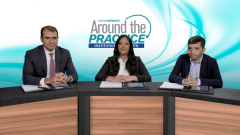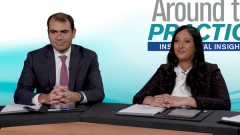
BCMA-Targeting Bispecific Antibodies in RRMM: Managing ICANS and Infections
Closing out their module on BCMA-targeted therapy in relapsed/refractory MM, panelists highlight the optimal management of ICANS and infections.
Episodes in this series

Transcript:
Ajai Chari, MD, PhD: Switching to a slightly different neurotox which I think Krina, you brought this up with ELRA with peripheral neuropathy. If you could characterize the more common neurotoxicity signal here if any and what folks need to be aware of?
Krina K. Patel, MD, MSc: The neurotoxicity we're learning a lot about with all these novel agents in our different patient populations and different CAR-Ts versus bispecifics. The traditional neurotoxicity with CAR-T was described in lymphoma patients so ICANS [immune effector cell associated neurotoxicity]. This is because as these T-cells are killing that lymphoma, you have all these chemokines and everything that goes through the blood-brain barrier, you have these other cells that might be involved that are causing it. We don't have an exact cause but there's lots of different ideas of what might be causing this. What it leads to is more cognition-type changes. For our patients, just like our CAR-T patients, our bispecific patients are admitted onto our CAR-T service. For our patients who are in the hospital, at least, we ask them what we call these ICE questions. They're 10 questions that ask them a mini neuro-cognitive testing type thing. We look at that score. We make sure they can write handwriting-wise. We know that when patients start having changes in their handwriting, that it's an early change of these neurocognitive things. I will say neurotoxicity probably scares me more than CRS. CRS I can do with my eyes closed. Neurotox is a little bit more. You need to act on it really, quickly. Thankfully, we don't see it very often. The teclistamab study, was 5 patients total that had 9 different events of ICANS and again, all grade 1/2 meaning that they might have scored a little bit off on that testing that they did with the ICE [immune effector cell associated neurotoxicity] scores or something was just off about their cognition and in the way we look at this. Most of these patients had it with CRS it got treated with TOCI [tocilizumab] and TOCI can help. However, traditionally we think that ICANS probably need steroids especially if there was no CRS when the patients got the ICANS, then we think that steroids are going to work a lot better. Again, a small number of patients, I think it was like 3%, which is again, all grade 1/2 but when you see it, you need to intervene. Steroids are one of the earlier steps we go into compared to with the CRS.
Ajai Chari, MD, PhD: I was remiss to not mention stay tuned for this year's ASH [American Society of Hematology meeting 2023] abstract. There is a bispecific where we'll be hearing data about empiric TOCI and how the overall rates of CRS dropped significantly further supporting, the use of early TOCI. We want to be cautious before recommending it across the board empirically because we should have formal data and approval and so forth. It speaks to what we all agreed. Early TOCI and should you have neurologic early steroids. Switching gears to infectious complications, which Al, you brought up in your case and my case patient also had that, what are your thoughts about the management of infections with teclistamab?
Alfred L. Garfall, MD, MS: Infections are a major risk, especially with long-term exposure, at least with teclistamab. We'll see with time with more data with other BCMA bispecific, other targets whether similar signals emerge. These trials took place during the COVID-19 era and there's been a long story of course about learning how to manage COVID-19 and hopefully reduced the risk of severe outcomes. There were several patients in the MajesTEC-1 study, unfortunately, who passed away due to complications of COVID-19. With time, it was apparent that some opportunistic infections were emerging, pneumocystis pneumonia, a few cases. There was one case of JC virus. Progressive multifocal leukoencephalopathy which is of course a dreaded and usually fatal brain infection that can develop in immunosuppressed patients. All patients with relapsed refractory multiple myeloma who have been through many lines of therapy or immunosuppressed, and we certainly see a lot of high-grade infections in this general population. That said, maybe there was perhaps the signal of a more intensive immune suppression with this agent, especially because many of these infections developed in patients whose multiple myeloma was under good control and suggest that there was an immunoparetic effect of teclistamab itself. That said, there's a lot we can do to prevent infections. And I talked about it in my case that I presented, of patients receiving intravenous immunoglobulin, patients on teclistamab develop profound hypogammaglobulinemia with IgG levels that often drop below 100 if without repletion. And then, standard prophylaxis, herpes zoster prophylaxis, pneumocystis prophylaxis, of course, is effective, and easy to implement with bactrim or similar agents. And just being very proactive about maybe being a little bit quicker to prescribe an antibiotic for an upper respiratory infection than you might in your traditional primary care clinic or even in your general oncology practice. This is the thing that we'll have to see in the big phase 3 studies, how the infection risk compares to comparator regimens. And how the net risks and benefits stack up. But I do think for the most part, it's a manageable risk, and certainly, of risk worth taking for patients really, within the label of really relapse refractory disease. But we must be vigilant about it and do all the appropriate prophylaxis.
Ajai Chari, MD, PhD: Well said. And just want to emphasize that you did this in your case very well too, the Covid-19 issue, right? Because there were 12 Covid-related deaths.
Alfred L. Garfall, MD, MS: Yes.
Ajai Chari, MD, PhD: Part of this, of course, is this was in the era of Covid-19 pandemic before vaccinations. It also highlights, a hypogamma and we've shown that all the BCMA, especially any BCMA bispecific. This isn't anyone, because you're repeatedly targeting BCMA, could affect your antibody production. To try to boost these people prior to therapy, give that evusheld and intervene when they have Covid-19. The other thing that this brings up is the adverse event management which is, in general, if you have severe grade III/IV toxicities, we hold the drug and also assess the myeloma status, right? Because the deeper and more durable myeloma remission, the more we are willing to dose reduce the drug. Because what's little unclear is what is the right long-term dose and schedule for this drug, right? Some bispecifics are looking at fixed duration therapy. As you can see in my case illustrated, that patient ended up on once monthly dosing and is doing great.
Alfred L. Garfall, MD, MS: Remember you think about this, Ajai, that, but one message that might be good to get out there is about vaccination for patients on bispecifics. And we don't think patients are antibody responses against vaccines and bispecifics. But at least, we've still been encouraging our patients to get vaccines. And data from your center, Ajai, showed that these patients cannot T-cell responses against vaccines. And even though we do things like IVIG and evusheld, I think it's important that patients still follow other recommended vaccine guidance to trying - it's still drive maybe some T-cell immunity against these important pathogens.
Ajai Chari, MD, PhD: No, absolutely. Two other things just to cover on the BCMA. Sham, any differences in toxicities that you can see across the BCMA bispecifics particularly the elra versus tec?
Sham Mailankody, MD: Honestly, no. The only thing numerically, is related to earlier on, this is likely higher rate of reported rates of neurologic toxicity with elra. Not so much the ICANS which are similar numbers, but some - perhaps signal of peripheral neuropathy, palsy, etcetera. Those have also been reported without the bispecifics, we're talking about small numbers in this study. It's hard to say that one drug as far as I can tell, no biologic reason that one of this would be different from others in terms of these toxicities. I would say look at the efficacy profile and the toxicity profile for these drugs to be very similar at this point with longer follow up. More patient’s freedom, maybe, something will separate out. But for now, they all look similar.
Transcript edited for clarity.
Newsletter
Stay up to date on recent advances in the multidisciplinary approach to cancer.









































